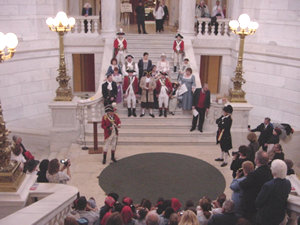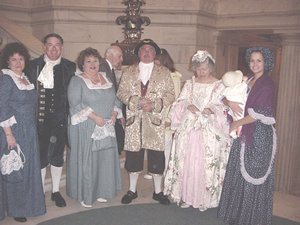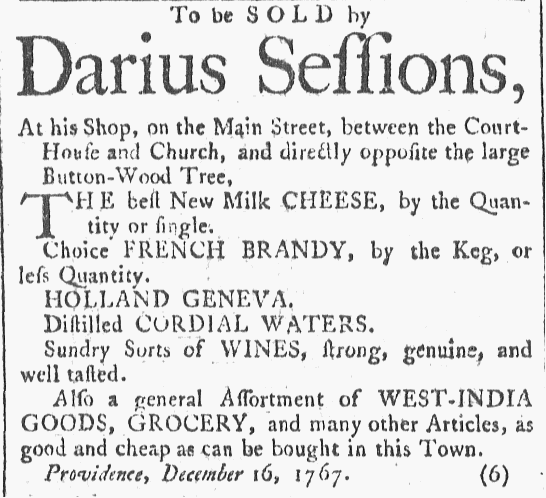Gaspee Virtual Archives Virtual Archives |
| RI
Deputy
Governor Darius Sessions
(1717-1809) The Gaspee Days Committee at www.gaspee.COM is a civic-minded nonprofit organization that operates many community events in and around Pawtuxet Village, including the famous Gaspee Days Parade each June. These events are all designed to commemorate the 1772 burning of the hated British revenue schooner, HMS Gaspee, by Rhode Island patriots as America's 'First Blow for Freedom' TM. Our historical research center, the Gaspee Virtual Archives at www.gaspee.ORG , has presented these research notes as an attempt to gather further information on one who has been suspected of being associated with the the burning of the Gaspee. Please e-mail your comments or further questions to webmaster@gaspee.org. |
|
Biography of Deputy Governor
Darius Sessions:
Darius Sessions was born August 17, 1717, in Pomfret, Connecticut to Nathaniel Sessions (8 AUG 1681) and Joanna Corbin (1686). His family was apparently quite well-to-do, as they owned large tracts of land in Eastern Connecticut. He graduated from Yale College in the class of 1737, and subsequently engaged in mercantile business in Rhode Island. In 1750, Sessions married Sarah Antram of Providence, with whom he had ten children . His son Thomas, in 1845, wrote of him: "Darius, my honored father, was a scholar, a merchant, a statesman, a Christian, a man. His sound judgment and legal information were generally considered conclusive, and the numerous applications to him gave a very extensive acquaintance."1 His developing leadership in protecting the home front was demonstrated when, during the French and Indian War c1763, Darius bankrolled the efforts of his brother, Captain Amasa Sessions, to raise and command a company of soldiers to fight in that effort . One man of great influence in his life was his neighbor, Chief Justice Stephen Hopkins, our great patriotic thinker who went on to sign the Declaration of Independence in 1776. Hopkins was a man of immense standing in the Colony, serving as Governor between 1756 and 1764, and dedicated to the rights of colonists over the Crown. His famous work, The Rights of Colonies Examined, "was a finely reasoned exposition of the situation confronting the colonies and the government of England, the appeal of a free and liberty-loving people against the curtailment of their liberties and the inauguration of a tyranny."2
Darius Sessions was part owner of the Providence based
privateer
sloop Reprisal in 1746 during
King Georges War2aa. We
do find a
brief
annotation that he served as the master of the schooner Smithfield
in 1750, then plying the waters of West Indies2a.
He was likely involved to some extent in the distillery business of his
father-in-law, William Antram, whose stillhouse was located just North
of Sessions's home in Providence2b.
In July of 1763 he was advertizing land for sale near Weybosset Street
on the west side of the Great Bridge. Sessions apparently was active in the circles of Brown University and became a close friend of its first president, James Manning. Sessions has been credited with locating of Brown University in Providence, using his influence in interesting the Brown family and others. An attempt had been made to locate the institution at either Newport or Warren, but Providence seemed better suited for the home of a large university3. By 1763 he was an Assistant, roughly equivalent to the more modern position of state senator. Darius Sessions found himself elected Deputy Governor of Rhode Island in May of 1769, succeeding Joseph Wanton who was elevated to Governor. Things became exciting three years later with the appearance of the Bristish revenue schooner Gaspee in the waters of Narragansett Bay. Judge Staples, who related the events in The Documentary History of the Destruction of the Gaspee, starts out his story with an alarming letter from Darius Sessions to Governor Wanton, then residing in Newport: PROVIDENCE, March 21, 1772.This initiated a chain of threatening correspondence between Wanton and the commander of the Gaspee, Lieutenant William Dudingston, and Dudingston's superior, Admiral John Montagu. After the incensed colonists attacked and burnt the schooner on the night of June 9-10, it was Darius Sessions who led the group of ranking officials to conduct the first investigations into the matter. Sessions proceeded to diligently interview Dudingston and his crew, and to offer the State's assistance and outrage in the matter. It quickly became apparent to all that the attack by Rhode
Island
citizens
could result in severe retribution by the British onto their colony.
The
day after the Gaspee burning, Daniel Jenckes, Chief Justice of
the
Inferior Court of Common Pleas for Providence County, advised Sessions
to attend to the matter immediately. If they did this, he felt nobody
could
blame Rhode Island's civil officials for approving or permitting the
attack
. It was decided that, at very least, Rhode Island officials must take
visible steps to assuage the King that all appropriate steps were taken
to catch the culprits that burned one of His Majesty's schooners. To
demonstrate
that a good faith effort was being made, Sessions advised Governor
Wanton to
publicize
a reward for the capture of the raiders. But, Deputy Governor
Darius Sessions hardly cooperated further with the British. In fact, he
developed plans from very early on to confound any attempts to find and
punish the attackers. Although the names of some of the participants of
the expedition must have been known to him, Sessions' dispatch to
Governor
Wanton telling of the grave incident asserted that the names of the
attackers
were unknown. It should also be noted, that Sessions applied for
and received compensation from the Colonial legislature for his trip to
Pawtuxet and sending the crew of the Gaspee back to Newport in the
amount of 9 pounds, 1 shilling. On June 12, Sessions wrote another letter to Governor Wanton, again pleading for him to issue a proclamation and a reward to find the culprits that burnt the Gaspee. In the same breath, however, Sessions did not hesitate to add insult to injury by questioning the legitamacy of Dudingston's boat: Some exceptions are taken at the Gaspee's being called his Majesty's schooner, as it is thought by some she, in fact, really was not, and consequently did not deserve that appellation. If the evidence we have in that respect be sufficient to denominate her a King's vessel, she ought to be called so, if not, then only without any compliment, the schooner Gaspee ...5Fearing less than optimal cooperation by local authorities, a Royal Commission was appointed by the British to investigate the matter and to discover any perpetrators. This commission of inquiry was empowered by the King to send any persons indicted directly to England for trial. This idea that a person could be sent overseas to be tried for a crime, rather than be tried near home by local powers was precisely the threat the incensed Americans colonial leaders to establish the Committees of Correspondence. As an additional threat to liberty, loyalist Massachusetts Governor Hutchinson had urged that Britain rescind the Rhode Island charter. Darius Sessions, after conferring with Stephen Hopkins and lawyer, John Cole, appealed to Samuel Adams as well as other colonial statesmen for advice. Adams pondered the dilemma thusly: It appears to me probable that the Administration has a design to get your Charter vacated. The Execution of so extraordinary a Commission, unknown in your Charter & abhorrent to the principles of every free Government, wherein Persons are appointed to enquire into Offences committed against a Law of another Legislature, with the Power of transporting the persons they shall suspect beyond the Seas to be tryed, would essentially change your Constitution; and a Silence under such a Change would be construed a Submission to it. At the same time it must be considerd that an open declaration of the Assembly against the Appointment & order of the King, in which he is supported by an Act of the British Parliament, would be construed by the Law Servants of the Crown & other ministers such a Defiance of the Royal Authority....6Adams went on to propose that Rhode Island be defiant and go down fighting, so to speak, or to at least stall matters by appealing the creation of the commission. It is in this second letter to Darius Sessions that Samuel Adams realizes in his postscript the necessity to reestablish the Committees of Correspondence: P.S. I beg just to propose for Consideration whether a circular Letr from your Assembly on this Occasion, to those of the other Colonies might not tend to the Advantage of the General Cause & of R Island in particular; I should think it would induce each of them, at least to injoyn their Agents in Great Britain to represent the Severity of your Case in the strongest terms.6Sam Adam's advice notwithstanding, Hopkins and Sessions ultimately decided on a campaign of subterfuge to frustrate the aims of the Royal Commission. With Governor Joseph Wanton being selected as the head of this commission, Lieutenant Governor Sessions and Stephen Hopkins were serendipitously placed into a position to influence its proceedings through the complicity of Wanton. Judge Staples notes that:: There is little room to doubt but that Gov. Wanton and the officers of the colony would have been satisfied that the authors of the mischief should remain undiscovered; although their duty as officers, and their interests required them to exhibit a great zeal and loyalty on the occasion.7The commanders of the attack on the Gaspee, Abraham Whipple and John Brown, had already instructed their crews never to discuss the event. But it was Sessions and Hopkins and the like that coordinated the efforts to lose evidence, threaten potential witnesses, and discredit those that did appear before the commission. Sessions and his cohorts made sure that other potential witnesses were informed to either refuse to appear before the commission (by pleading ill health, bad weather, bankruptcy, and the like) or to deny any knowledge of the case. Sessions took great pains to attack the reliability of Aaron Briggs and Stephen Gulley. Briggs was the black indentured servant whose testimony, while clearly suspect, gave the names of several of the attackers. Gulley, a Smithfield farmer who claimed second-hand knowledge of the attackers, related in his testimony the existence of a 'Vigilance Committee' that threatened reprisals to anyone giving testimony or identifying the raiders8. It is noteworthy that, by and large, the rest of the Rhode Island citizenry also kept quiet about what was known despite the fact that identities of the attackers were known to many, but the vast majority of local people were supportive of the attackers. Sessions, Hopkins, et al also determined to influence how the commissioners were to interpret their special powers. Natalie Robinson states in Revolutionary Fire: The Gaspee Incident that: As a result of this review, and of interviews with Governor Wanton, Lieutenant Governor Sessions, and Chief Justice Hopkins, the Commissioners agreed to interpret their powers quite narrowly. They assured the Rhode Island officials that they would not themselves arrest anyone or deliver anyone to Admiral Montagu, but would leave that task to the regular judicial officials in the colony. ... By acknowledging local judicial authority, the Commissioners calmed some of the Rhode Islanders' worst fears.9Per their instructions, the commissioners turned over their collected evidence to the Rhode Island Superior Court for indictments, if warranted. Rhode Island Justice Heime attributed the failure of a grand jury to be charged and to conduct an investigation simply to his own 'forgetfulness'. Chief Justice Stephen Hopkins found that the depositions "do not induce a probable suspicion" and asked the commissioners if they were "of a different sentiment." The commissioners, holding to the narrowed interpretation of their powers, replied, "We decline giving any sentiment or opinion in the matter."10 They felt that it was for the Rhode Island court to judge the matter and for the Rhode Island Deputy Governor to act upon it (which, of course, Sessions never did). Sessions' key role in interfering with the intent of the Gaspee Commission is clearly evident throughout the records. Dr. Richard Deasy, in his forward to the 1990 reprinting of the Documentary History of the Destruction of the Gaspee, points out that: Sessions continued to discredit Briggs's testimony, to excuse witnesses who had been summoned, and to take depositions on his own initiative. His self-imposed role as amicus curiae [friend of the court --ed] clearly influenced the course of the inquiry.11In June 1773, the Commission of Inquiry into the Burning of the Gaspee closed up frustrated, without a single indictment being handed down. Rhode Islanders, and their precious Charter, were saved. After the Gaspee Affair was over, Darius Sessions was appointed in 1774 to a position of being in charge of Rhode Island's military preparedness12. By this time, the battle was brewing between revolutionary and loyalist elements in the American colonies, and war was seen as almost inevitable. But Sessions either did not run for, or was not elected, Deputy Governor in May 1775, despite the fact that Joseph Wanton was reelected Governor at that time. Wanton, Sessions and a few others had taken the position of not supporting the establishment of a standing army within Rhode Island, out of fear of overwhelming British retribution13. The hawkish State legislature then prevented Wanton from being sworn in as Governor, and he was deposed in November 1775. Nicholas Cooke, who succeeded Sessions as Deputy Governor in May, was elevated to Governor to succeed Wanton at that time14. In October 1775 Sessions wrote a letter to the General Assembly, craving forgiveness, and "was received into their favor and friendship."15 During the American War of Indepedence it is known that Darius Sessions clearly sided with the revolutionary causes, and returned to his farm in Connecticut which he had purchased in 1761. Sessions had the farm house totally reconstructed into a stately colonial mansion. Governor Sessions also took much pains with his grounds and farm, making, according to (Brown University) president James Manning, "Truly Wonderful" accommodations. In this fine country seat many patriots found a safe retreat from the constant alarms and perils of the seaboard, making it almost a war office and place of general consultation16.Even George Washington visited the Sessions' command post on occasion17. Together with his son, Thomas, Darius Sessions & Son invested in shipping between Rhode Island and St, Croix in 1795. In 1786 his 175 acre farm was being offered for sale17a, but it is reported Darius Sessions lived the remainder of his life on his farm, "declining public honors". He died April 27, 1809 at 92 years of age, "to appearance in full strength of mind." and was returned to Providence to be buried in the Old North Burial Ground18. This cemetery is where many of those involved in the Gaspee affair were ultimately laid to rest. His wife, Sarah Antram Sessions is buried with him. He left ten children:
|
| Genealogical Addendum: Darius Session' married his wife, Sarah Antram (1724c - 26 DEC 1779) on 26 May 1750 in Pomfret, CT. She was the daughter of William Antram and Sarah FENNER (1698-1736). William was Sarah Fenner's second husband (information updated courtesy of descendant Cherie Antrim-Bell): Marriage 1: Dr. John JENCKESNote that both Sarah Fenner-Anstram and Abigail Anstram died in 1736 probably from childbirth complications. During the 1774 Rhode Island Census, Darius Sessions' family consisted of: WHITES. MALES. Above 16.: 2 (Darius himself and son William)The census comparison is only slightly off from Darius Sessions' known family. He might have had a niece staying with him. |
| The Gaspee Days Committee proudly recognizes Rhode Island Deputy Governor Darius Sessions as an 'unindicted co-conspiritor' in the Gaspee Affair. |
|
End Notes: 1Munro, Wilfred H. Memorial Encyclopedia of the State of Rhode Island. American Historical Society, Boston, 1916, p134.2Carroll, Charles. Rhode
Island: Three Centuries of Democracy. Vol. I, p235. 2aaChapin, Howard M. Rhode Island Privateers in King George's War : 1739-1748 Providence: Rhode Island Historical Society :, 1926, p182. 2aHedges, James B. The Browns of Providence Plantations: Colonial Years. Cambridge, Harvard University Press, 1952. Page 11. 2bCherie Antrim-Bell <cherbearbell@charter.net>, personal communication e-mail, October 2003. Cherie is a descendant of the Antram family that Darius Sessions married in to. 4Staples, William R. The Documentary History of the Destruction of the Gaspee, p3. 5Staples, p20. It is the considered opinion of Royal Navy historians in the United Kingdom, that, given the time period and historical context, the Gaspee would rightly be referred to as His Majesty's Schooner Gaspee, or simply, HMS Gaspee. 'His Majesty's Ship' would be reserved for those vessels with three or more masts. Many thanks for e-mail on this point from the crew of H.M.S. Richmond, a virtual re-enactment group. 6Letters from Samuel Adams to Darius Sessions, Dec. 28, 1772 & Jan 2, 1773. 9Robinson, Natalie. Revolutionary Fire: The Gaspee Incident. 11Deasy, Richard M. Introduction to Documentary History of the Destruction of the Gaspee, p.xxix. 14See Biography of Governor Joseph Wanton. 16Larned, Ellen D. History of Windham County, Connecticut. Worcester, Mass.: Charles Hamilton, 1858, p761. 17Larned, Ellen D. Historic
Gleanings
in Windham County, Connecticut, 1899, p149. 17aProvidence Gazette, 15Apr1786 18RI
Historical Cemetary Reference: PV001: North Main Street,
Providence.
20 feet West of telephone pole #140. |
 . . The (mock) 'Indictment of Darius Sessions' as portrayed at the RI State House on May 2, 2002. Darius was played by his eighth generation descendant, Brian Sessions (in gold coat) from Warwick, RI |
| Back to Top | Back to Gaspee Virtual Archives |
